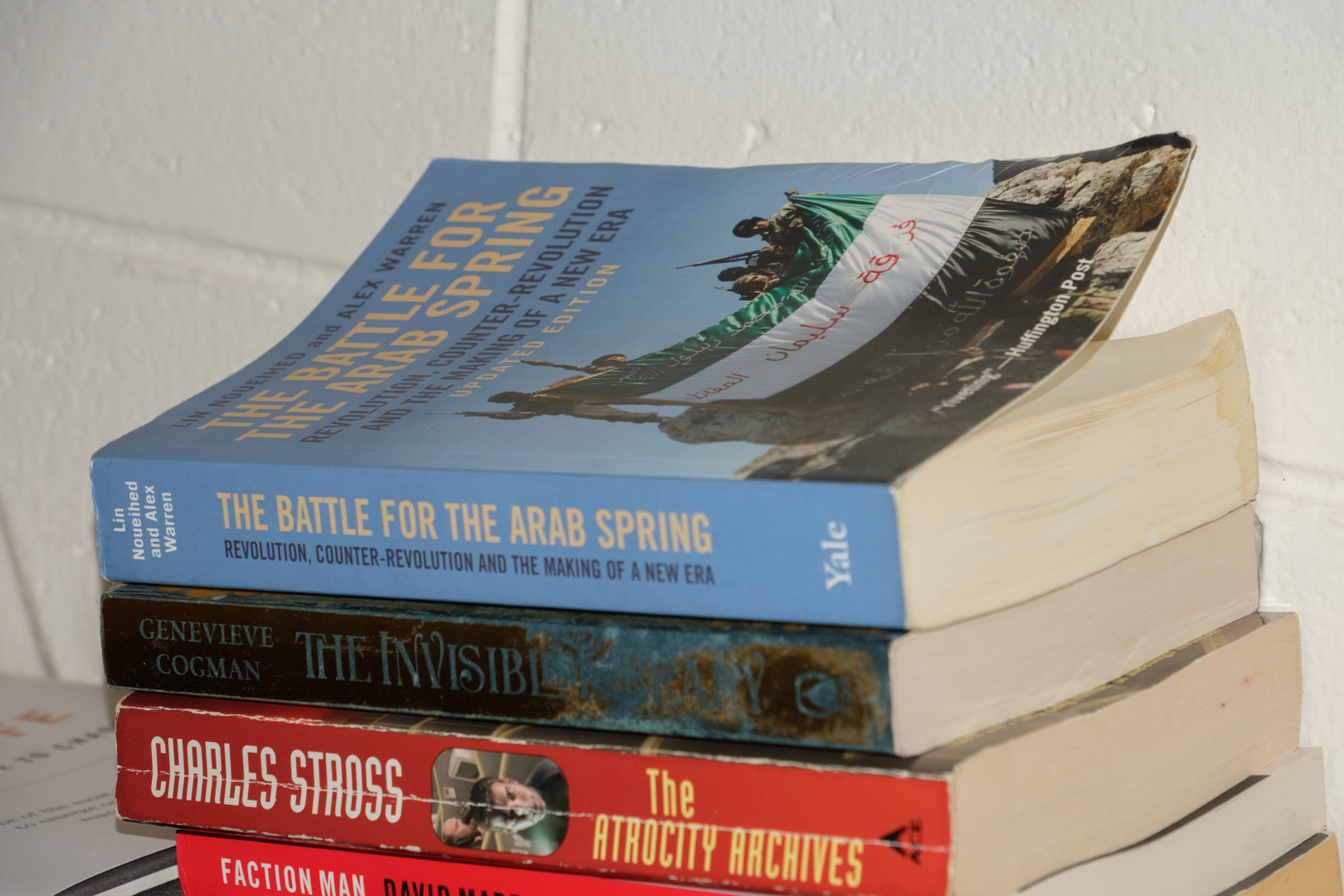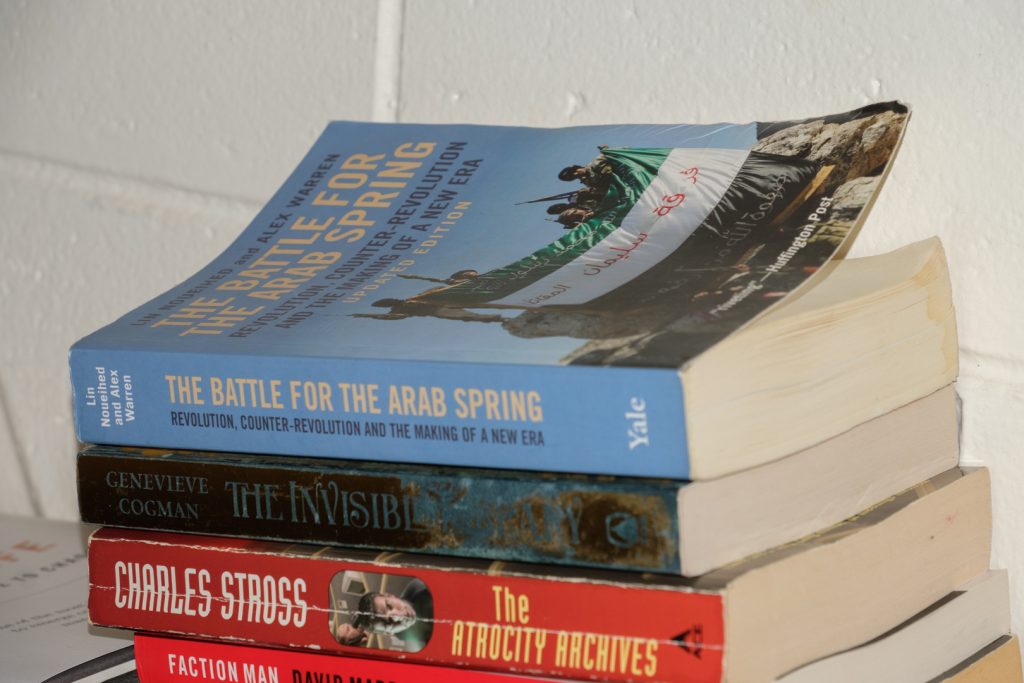The self-immolation of Tunisian vegetable seller Mohammed Bouazizi in late 2010 set off a wave of protest and revolution against stagnant dictatorships across the Arab world. Ordinary citizens stood up against their tyrants and forced them out with people power. Lin Noueihed and Alex Warren’s The Battle for the Arab Spring tells the story of these rebellions – a tale which should be heeded by those who seek a better world.
The Battle for the Arab Spring was published in 2013, in the immediate aftermath of the revolts. There are academic benefits to its contemporaneous nature, but I found it felt outdated. While the initial flashpoints in Tunisia, Egypt and Bahrain were comfortably resolved by the time of publication, the conflicts in Libya, Yemen and Syria continue to this day. Worries about Al-Qaeda in the Arabian Peninsula being boosted seem quaint in comparison to the Islamic State which emerged from these chaotic civil wars. Even in the countries where rebellions were successful, a longer lense would provide a sharper perspective on developments in these nascent democracies.
Despite its flaws, The Battle for the Arab Spring provides a capably sourced and readable account of this epochal event, covering the prelude and each country’s specific dimensions well. It demonstrates how it is possible for popular pressure to reach across national boundaries and topple states, even in the modern era. But the events of the Arab Spring also suggest we should be wary of unforseen consequences, both at local and international levels. Here are the lessons I’ve learned from the Arab Spring:
Material conditions still matter.
The Arab world had a baby boom which is now bearing fruit, with serious demographic consequences. In the most extreme example, the average age in Yemen was 21 at the time of the uprisings. In virtually every country in the region, more than half of the unemployed population were between 15 and 30. These young people were well educated, but neither the market nor the increasingly privatised state could provide enough jobs for them (let alone those suitable for their skills). In Cairo, 54% of the unemployed had a university level education.
Disaffected, educated youth will find ways to respond, just as the rebels of 1968 did in the West. In the democracies of Europe, similar youth movements gave rise to Podemos and Syriza, but without political participation the disenfranchised of the Arab world took to the streets as their only available option. I’d suggest that those fighting for ISIS since are also part of this demographic bump.
The media will report on what it sees.
In the popular media narrative of the Arab Spring, it was an uprising driven by Twitter, Facebook and internet communications. While these new forms of communication certainly played a role, it was overemphasised by Western media who lacked reporters on the ground and so relied upon the online discourse. The lack of internet penetration in the region is demonstrated by the way that only 6.7% of people had a Facebook profile at the time of the uprisings. Much more important was the role of satellite television in breaking the hold of traditional state-run broadcasters, providing international dialogue and criticism of the ruling regimes.
Rebellion is not enough.
The initial demonstrations combined coalitions of activists who agreed only on a central demand – the removal of their tyrants. In the more optimistic examples, the activists succeeded in this removal. But these groupings of youth and trade union activists didn’t have any organisation or unified positive vision for the future. They were overly focused in the online realm, where the bulk of the population was not present. Once they got the free and fair elections they demanded, both Egypt and Tunisia elected Islamist parties whose charitable arms had been serving the community. The disparate groupings of activists were trounced without the manpower, community recognition or history of their Islamist opponents.
A group which forms spontaneously can combust just as quickly. While negative demands like the removal of a dictator can gather support in opposition, without a positive unifying vision these groups will shatter once their initial demands are met. Much like Tony Abbott’s Liberal Party, really. Despite womens’ rights campaigners being part of Egypt’s successful coalition, this failure of organisation led to the election of the Muslim Brotherhood, who are harsher on these rights than the ousted Mubarak government ever was.
Beware of geopolitics.
A nation’s armed forces will always be wary of firing on their own citizens, who they theoretically serve. But those of alied countries will have no such qualms. Bahrain’s protests were crushed by Saudi troops, brought in to protect the ruling family who were their close allies. The Assad regime in Syria has been substantially supported by their Russian and Iranian allies. A regime with international masters will be propped up by those powers.
International support can help rebels, but also poses the risk of derailing their programs. In Libya, military intervention by American, British and French forces did remove Gaddafi, but replaced him with a National Transitional Council comprised of former regime members. This NTC did not command the support of the populace and as a result, the country has fallen into a prolonged civil war.
Old allegiances die hard.
In many of these Arab countries, old tribal or religious differences retain a hold upon the populace. Religious and ethnic splits within a country have provided the foundations for the worst of the drawn out conflicts. In Syria, Assad’s Alawite and religious minority supporters hold fast to a regime which will provide better conditions for them than any alternative aligned with the Sunni Muslim faith of the majority. In Yemen, the rebellion was hijacked by intertribal conflicts between existing power groups.
Groups aligned with a minority regime will stand firm against a majority regime, particularly when they feel at risk of oppression. Existing, presently apolitical groups also provide a locus of organisation which can shape the political future by filling a power void, as happened in Egypt and Tunisia.
When an irresistable force meets an immovable object, civil war is the result.
Regimes without popular, military or international support can be ousted peacefully. But if a government is unwilling to vacate and rebels won’t compromise, then a peaceful protest can morph into a civil war all too easily. Bahrain’s rebels accepted their defeat after the state and its allies cracked down on them. They may still live under an unelected monarchy, but I’d wager life is better there than in Syria’s never ending civil war. Any regime which comes out of a civil war will be like the conflict – ugly, tribal, paranoid and seeking vengeance.
The Battle for the Arab Spring: Revolution, Counter-Revolution and the Making of a New Era, written by Lin Noueihed and Alex Warren was published by Yale University Books in 2013. My copy was purchased 2nd hand from the always excellent Canty’s Bookshop. This post is part of the Book Nook series, as I fiddle with its layout and presentation to encourage my own critical and reflective writing rather than falling into a simple review trap.

